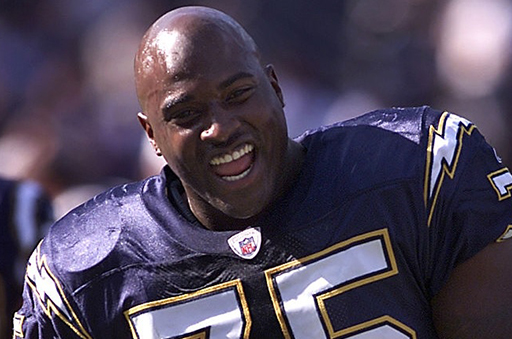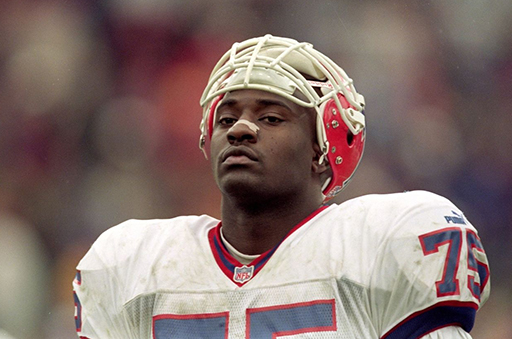Catching Up with Former Reps: Marcellus Wiley

Former NFL defensive end Marcellus Wiley spent 10 seasons with the Bills, Chargers, Cowboys, and Jaguars. He began his collegiate career at Columbia University where he was both a first team All-American and All-Ivy League pick. In 1997, he graduated from Columbia University with a degree in sociology. We caught up with Marcellus where he gave us insight into his life during and after football.
Q: What is your current career?
Host of Speak For Yourself on Fox Sports 1. I’m a broadcaster, I talk for a living.
Q: How would you describe your experience leaving the game?
The transition for me started before I even entered the game; I always had a dual experience between prioritizing my academics and my athletics, and balancing that. That’s what led me to the Columbia University: the academic reputation and the proper branding post football. I thought about the next while I was still in the now. I think the transition for me, like any other guy, was tough, difficult in finding what passion existed outside of playing the game. How could I realign that passion and put it into a place where I really look forward to going through the process, the work, and showing the same attributes that I showed as a player in the real world. I think that’s the most difficult thing, to find that place where you feel like you can put in the same work and have the same response that you got from playing the game. I went through that process like everyone else and finally felt comfortable once broadcasting became an opportunity for me and I was able to take advantage of it.
Q: What are you most proud of during your time as a player rep?
A couple things. One is to go beyond the stigma that being a player rep was just about being on the team, taking a free trip to Hawaii. To really learn and go beyond the game, to really dive into the books, the legalities, the rules, the economics, and the issues at hand. To have my finger on those aspects of the game was really eye opening. You must learn how many levels of entities that exist behind just playing the game. That was remarkable. I began to feel a sense of pride once I began to realize that I was representing more than just my team, I was more to the NFL than just a player. I was armed with more intelligence and information than the average player which always gave me confidence. That certainly helped in my transition to know that I was more than just a player. I would never bow down to any situation because I knew I could be fully prepared and embedded beyond just my performance.
Q: How has being a player rep impacted you personally & professionally?
Certainly, I know more than the average player, I would assume because not only did I go to the meetings, but I paid attention and was really involved. I was able to see the infrastructure, ideology, to see the real chess match that was being played in terms of the NFL & NFLPA. In many times in accord and in distance, trying to make the game better for all. I just have another level that I’m privy to that most guys are not. It was more than just blocking, tackling, sacks, and touchdowns for me. I got to know the world I was living in and know it at a deeper level.

Q: What advice would you give to yourself looking back?
Biggest regret I had was not being able to live up to my full potential largely because of injuries. I never was able to show the world exactly what I was able to do because of the injuries but that’s part of the game. The greatest conversation I could have with my former self would be when you were injured, to step away and don’t return until you're right. I fell victim to the pressure of success more so than failure. I kept coming back when I was doing well even though I was injured. While I was doing well I had a back surgery and had 10 ½ sacks only to come back and break my foot. I’m the guy that’s buying into the team concept and loyalty to a point where I was really burning and exhausting myself out. I kind of gnawed too much off the bone in trying to play through injuries. I should have took my time to fully recover and I didn’t. Looking back now it’s funny because I’ve seen guys with that same injury take time away and make sure they have a full recovery. They had longer more consistent careers than just the peaks in which I felt I had. I was undermined by my injuries and by my own bravado of returning to the field too quickly.
Q: Have you taken advantage of any of the services of the PA since retirement?
I go to a lot of former player events. I certainly support those events and it’s good to see those guys and have conversations to kind of keep the fraternal element alive. I still feel like I’m a part of the family which is always a good thing. I think in those moments you really get exposed to more of the positive and success stories of guys that made the proper transition. The proper transition isn’t just did you find something lucrative after the game. It doesn’t just mean you’re a broadcaster or in the limelight it just means you transitioned properly to be a well-formed citizen, family man, and a person who was able to take care of his responsibilities. Being able to move the ball forward and use your generational wealth for you and your family.
Q: What’s next for you?
On his book:
“Never Shut Up”. Inspirational story about a fork in the road kid from a dire situation growing up in Compton in South Central, LA. Had to plot, plan, and calculate his decisions to give him and his family the best chance of success in this world. It’s a story to inspire others to really plan, dream, and to realize. Through perseverance, it can all be accomplished. Being a living testament to that I want to make sure I spread that inspiring message. No matter what that goal and aspiration is, the most important thing is to really focus around your identity. Know who you are and know who you are not. The essence of everyone is to never shut up cause this world will try to tell you who you are, and you’ve got to tell the world who you are and never shut up about it.
On his family:
I really love the family aspect that comes into play post retirement. Family plays an integral part in helping you and your transition. Giving you other things to identify with and really returning you to the simple things. Because I think as a player, it’s such an amazing experience from the ambitions of playing at such a young age and thinking you’re going to make it. To be one of the few that make it, life doesn’t slow down for those types. It’s so fast and such a rush that when you get over that experience a lot of people think that new speed is too slow but, it’s just what you need for what you’ve been through. You just got to learn to appreciate that new speed of life and not look at that as depression or not having a passion. Basically, not looking at those things as negatives but really finding joy in all the little things in life. Just watching my son grow up and not having to tap him on the shoulder for road trips or offseason workouts. Just living day by day and moment by moment is so amazing. You’ve just got to transfer all those abilities and attributes that we learned on the field. We’re more prepared for this real world than the people who live in this real world if we can just have the same confidence in ourselves off the field as we do on the field. I always say to all my brothers especially football players: CBA (Conceive, Believe, Achieve).